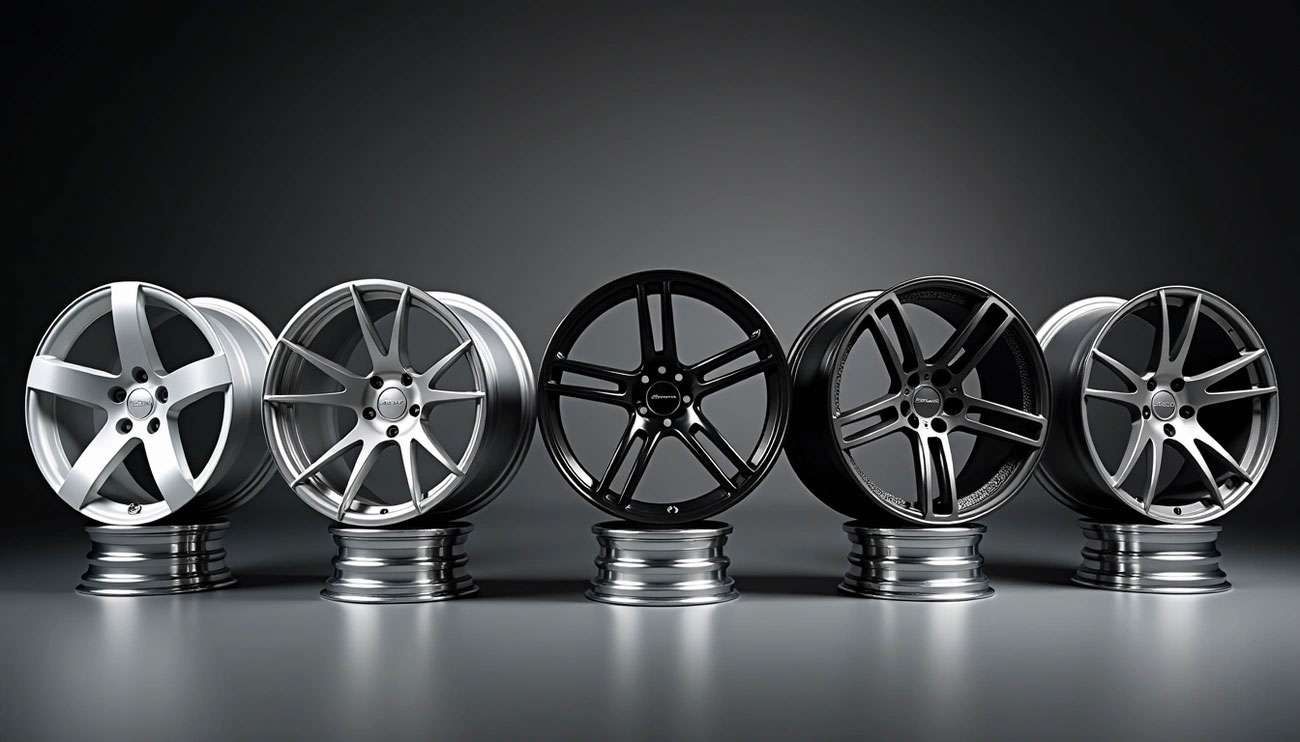
Aluminum alloy rims have become the standard choice for most passenger vehicles today. Alloy wheels dominate the market, replacing traditional steel wheels on nearly every new vehicle straight from manufacturers.
Alloy wheels gained popularity for excellent reasons. They're over 21% lighter than steel wheels, delivering advantages like more precise steering, improved acceleration, and reduced fuel consumption. Beyond performance benefits, alloy wheels provide a more streamlined appearance compared to conventional steel options.
Alloy wheels are manufactured using aluminum combined with other metals, creating a product that's both lightweight and durable. With an impressive 21 distinct classes of alloy wheels currently available, the options for customizing your vehicle's look and performance are nearly endless.
We'll guide you through the five main categories of alloy wheels and help you understand which type best suits your specific needs and driving style. Each type offers unique advantages, from budget-friendly cast options to premium forged designs that deliver maximum performance. Whether you're looking to enhance your daily driver or build a custom performance machine, understanding these differences helps you make the right choice for your vehicle and budget.
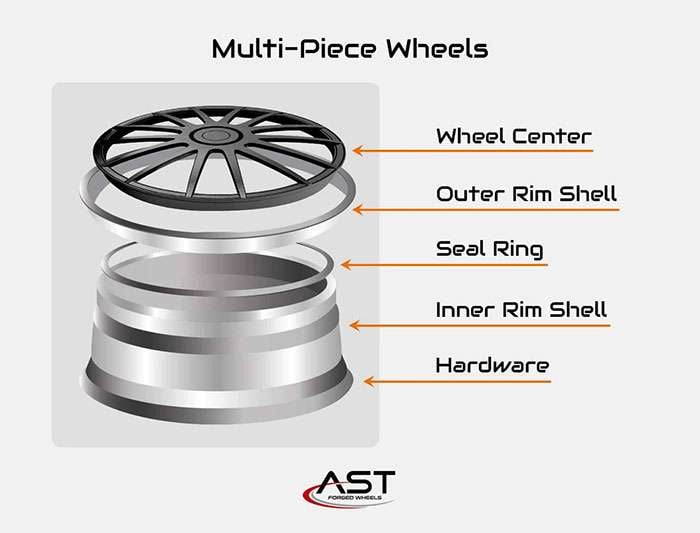
Image Source: Forged Wheels
One-piece alloy wheels represent the most common wheel type you'll encounter on roads today. These wheels are manufactured from a single, continuous piece of metal—typically aluminum alloy. The construction involves either casting molten aluminum into a mold, flow forming, or forging a solid piece of metal into the desired shape. This unified construction sets them apart from multi-piece wheels that combine separate components.
The manufacturing process directly impacts the wheel's performance characteristics and price point. Cast wheels are created by pouring molten magnesium or aluminum alloy into a mold where it cools and takes shape. Forged wheels start with a solid block of alloy that undergoes intense heat and pressure before being finished with precision milling equipment.
The defining characteristic of one-piece wheels is their unified construction, combining both the face (center section with spokes) and the barrel in a single casting or forging. This creates a seamless structure without joints or assembly points.
These wheels come in three primary manufacturing variations:
Cast wheels - Produced by pouring molten aluminum into molds, offering cost-effective production but relatively heavier construction
Flow-formed wheels - Initially cast, then the barrel is stretched using heat and pressure, creating a thinner yet stronger structure
Forged wheels - Created from a solid aluminum billet under extreme pressure, resulting in the strongest and lightest option
One-piece wheels feature fixed dimensions with set sizes and backspacing. The manufacturing techniques allow for intricate designs and various finishes, making them visually appealing while maintaining structural integrity.
Pros:
Higher tensile strength due to single-piece construction, particularly in forged versions
Lightweight design, especially without additional bolts or assembly components
Minimal maintenance requirements compared to multi-piece alternatives
Lower production costs leading to more affordable pricing
Mass production allows for immediate availability from warehouses nationwide
Extremely durable with strong resistance to damage
Clean appearance with smooth finishes
Simplicity in design and structure
Cons:
Limited customization options for backspacing, offset, and width
When damaged, typically requires replacement of the entire wheel
Cannot be tailored for different fitments and offsets
May occasionally require light vehicle modifications to fit properly
Damage often renders them beyond repair in motorsports environments
One-piece wheels excel on stock or mildly modified vehicles where owners aren't focused on maximizing their wheel/tire package. Their balance of strength, weight, and affordability makes them perfect for daily drivers and street performance applications.
These wheels perform exceptionally well in high-performance applications where durability and weight reduction are crucial factors. For race enthusiasts seeking the optimal balance between performance enhancement and visual appeal, one-piece forged wheels offer substantial advantages over standard cast options.
They suit vehicles that don't require extensive customization of wheel specifications. Their ready availability and standardized sizing make them ideal for popular vehicle models where aftermarket fitment options are plentiful.
The cost of one-piece alloy wheels varies primarily based on manufacturing method and brand reputation. Here's our price breakdown:
| Manufacturing Type | Starting Price Range | Premium Price Range |
|---|---|---|
| Cast Aluminum | $233-$342 | $494-$590 |
| Flow-formed | $350-$500 | $600-$800 |
| Forged | $500-$800 | $1000+ |
Prices typically increase with wheel diameter, with common sizes ranging from 15" to 22". Specialty finishes and designs from premium brands command higher prices within each category.
One-piece wheels offer better long-term value despite potential higher upfront costs for premium options. Their durability and lower maintenance requirements often result in cost savings over time.
The longevity of one-piece alloy wheels depends primarily on the manufacturing method, driving conditions, and maintenance practices. Forged wheels demonstrate superior durability compared to cast alternatives due to their denser, stronger construction.
With proper care, one-piece wheels can last the lifetime of a vehicle. Their single-piece design eliminates potential failure points like bolts or seams found in multi-piece wheels. This increased structural integrity provides exceptional durability even under demanding conditions.
Regular maintenance substantially extends wheel lifespan. Simple practices include:
Cleaning with gentle soap and water solutions while avoiding harsh chemicals
Regular inspection for damage signs such as cracks or bends
Prompt addressing of any issues before they worsen
One-piece wheels handle daily driving stresses exceptionally well. Their unified structure distributes forces evenly throughout the wheel, preventing concentration points that might lead to premature failure. They remain the preferred choice for both everyday drivers and performance enthusiasts seeking reliability without constant maintenance concerns.
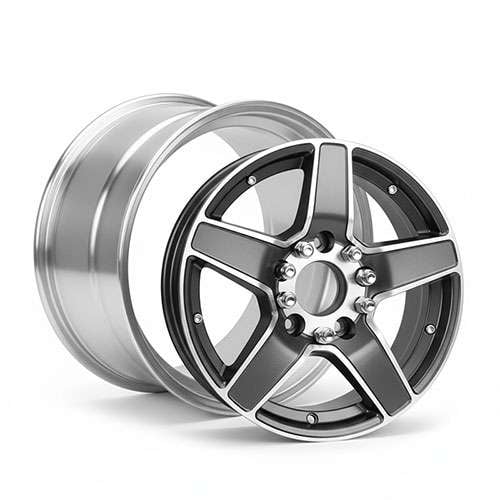
Two-piece alloy wheels take a completely different approach than their single-piece counterparts. These wheels consist of separate components that are joined together to form a complete wheel. You'll find two distinct parts: the barrel (the rim) and the face (center piece with spokes). The components are either bolted or welded together, creating a modular wheel structure that offers unique advantages for specific applications.
Construction methods vary significantly. Some wheels feature a cast aluminum center welded to a forged aluminum barrel, while others utilize a forged aluminum center welded to a forged aluminum barrel. This dual-component design allows manufacturers to engineer wheels that can be precisely tailored to various performance requirements.
The modular construction of two-piece wheels enables extensive customization options. Unlike one-piece wheels with fixed dimensions, these wheels offer remarkable flexibility in sizes, widths, backspacing, and finishes.
The manufacturing process involves either welding or bolting the components together. Welded designs create a stronger unified structure, whereas bolted wheels facilitate easier repairs and adjustments. The center section houses the spokes and connects to the vehicle's hub assembly, while the barrel forms the outer edge where the tire mounts.
Two-piece wheels excel in their ability to be custom-made to exact specifications. This precision manufacturing makes them ideal for modified vehicles requiring specific fitment solutions. The assembly method significantly impacts performance characteristics—bolted wheels offer greater adjustability but may require more regular maintenance.
Pros:
Highly customizable with various offset, width, and finish options
Enhanced repairability with the ability to replace individual components when damaged
Greater flexibility in custom sizes and specifications
Allows for color customization in almost any combination desired
Improved strength and longer fatigue life in tough driving conditions
Better weight distribution resulting in smoother handling
Cons:
Higher initial cost compared to one-piece wheels
Slightly heavier than comparable one-piece designs
Welded versions may be difficult to repair if damage occurs at the weld points
Bolted designs require more regular maintenance to ensure fasteners remain secure
Manufacturing complexity leads to longer production times, often requiring custom ordering
The long-term value proposition becomes clear when considering repair options. Instead of replacing an entire wheel when damaged, you can often replace just the affected component.
Two-piece wheels shine in custom builds and performance-focused applications where precise fitment and personalized styling are essential. They're particularly suited for vehicles with extensive suspension or body modifications.
Performance enthusiasts and racing teams often choose two-piece wheels for their adaptability. The modular nature allows for tailored specifications that optimize vehicle handling characteristics. This customization capability makes them ideal for those wanting the largest and widest wheel and tire package possible.
Off-road enthusiasts benefit from these wheels as they provide better traction and stability across varied terrain. Coupled with their superior heat management properties, two-piece wheels handle demanding conditions remarkably well. For modified Jeeps and trucks, these wheels deliver improved performance while maintaining the aggressive look many owners desire.
Two-piece alloy wheels command higher prices than one-piece alternatives due to their enhanced customization options and complex construction. The cost varies based on construction materials, manufacturing techniques, and brand reputation.
Two-piece forged wheels typically range from approximately $1,100 to $1,600 per wheel. Premium brands and larger diameters (22-24 inches) typically fall at the higher end of this spectrum:
| Size Range | Starting Price | Premium Price |
|---|---|---|
| 19-20 inch | $1,100-$1,175 | $1,225-$1,350 |
| 21-22 inch | $1,150-$1,400 | $1,450-$1,500 |
| 23+ inch | $1,150-$1,500 | $1,600+ |
The pricing reflects the labor-intensive manufacturing process and customization capabilities. Many manufacturers offer these wheels as "special order" items, highlighting their bespoke nature.
Two-piece alloy wheels demonstrate exceptional durability, particularly in forged versions. Their longevity depends primarily on construction quality, driving conditions, and maintenance practices.
Two-piece wheels offer superior strength for tough driving conditions. Their fatigue life is significantly longer than single-piece alternatives when subjected to impacts or stress. Tests show they handle repeated stress remarkably well before showing signs of failure.
These wheels present a significant repair advantage. If damage occurs to either the barrel or face, only the affected component needs replacement—a more economical solution than replacing an entire one-piece wheel. This modular design extends the effective lifespan of the wheel set as a whole.
For off-road applications, two-piece wheels demonstrate excellent durability across rough terrain. Their ability to distribute weight more evenly reduces concentrated stress points, contributing to longer service life. With regular inspection and maintenance, particularly of any bolted connections, these wheels can remain serviceable for many years of demanding use.
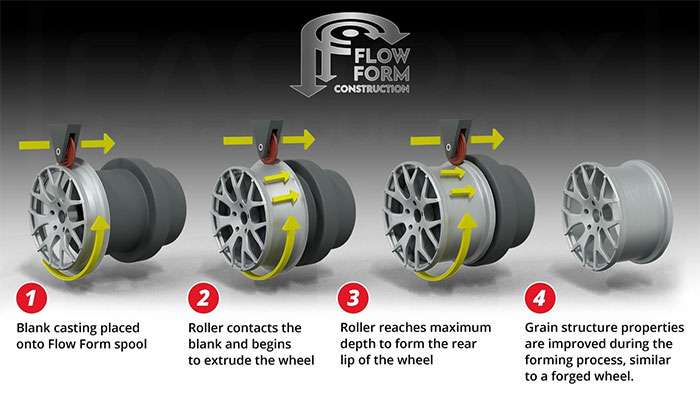
Image Source: Factory Reproductions
Forged alloy wheels represent the pinnacle of wheel technology. These premium wheels begin as solid aluminum billetsâ€"high-grade aluminum chunks that undergo extreme pressure and controlled heat. Unlike cast wheels created by pouring molten metal into molds, forged wheels are shaped by compressing the metal under massive hydraulic presses, often applying between 8,000 and 10,000 tons of pressure.
This intensive manufacturing process fundamentally alters the metal's internal structure. The extreme pressure realigns and compresses the grain structure of the aluminum, creating a denser, stronger material with superior mechanical properties. Computer Numerically Controlled (CNC) machines then precisely shape the compressed aluminum into the final wheel design, allowing for intricate detailing and customization.
The compressed grain structure gives forged wheels extraordinary strength. The forging process eliminates potential failure points like porosity, shrinkage, and air pockets that occur in cast wheels. This results in wheels with superior structural integrity and exceptional strength-to-weight ratio.
The superior density allows manufacturers to use less material while maintaining strength. Forged wheels are approximately 25-30% lighter than comparable cast wheels. This weight reduction is crucial for performance applications since it reduces unsprung mass—the weight not supported by the vehicle's suspension.
Forged wheels typically use premium materials. Many manufacturers select aerospace-grade aluminum alloys such as 6061-T6, known for their exceptional tensile strength and resistance to stress. These high-quality alloys enable manufacturers to create wheels with thinner spokes and weight reduction pockets without compromising durability.
Pros:
Exceptional strength—forged wheels can withstand higher stress and impact compared to other wheel types
Significantly lighter weight—typically 25-30% lighter than cast alternatives
Superior heat dissipation during aggressive driving
Enhanced performance through reduced unsprung weight, improving acceleration, braking, and handling
Higher resistance to bending, cracking, and deformation under pressure
Extensive customization options for diameter, width, offset, and finish
Improved fuel efficiency due to reduced rotational mass
Cons:
Substantially higher cost due to intensive manufacturing process and premium materials
Limited availability in certain sizes or designs compared to cast wheels
Difficulty and expense of repairs when damage occurs
Longer production times, often requiring custom ordering
Ultra-light designs may be more susceptible to cracking on rough roads
Forged wheels excel in performance applications where every fraction of weight matters. High-performance sports cars benefit immensely from the reduced unsprung weight, which directly improves handling, acceleration, and fuel efficiency.
Motorsport environments represent ideal applications for forged wheels. The superior strength-to-weight ratio makes them perfect for race cars subjected to extreme forces during competition. Professional racing teams choose forged wheels because they offer uncompromised performance under the most demanding conditions.
Luxury vehicle owners often select forged wheels for both performance enhancement and visual customization. The precise machining process allows for intricate designs and finishes that complement premium vehicles while providing tangible performance benefits.
Off-road enthusiasts benefit from forged wheels' superior durability. Their resistance to bending and cracking makes them suitable for rough terrain where impacts are common. For serious off-road applications, the structural integrity of forged wheels provides confidence during challenging conditions.
Forged wheels command premium prices reflecting their sophisticated manufacturing process and performance advantages. Entry-level forged wheels typically start at approximately $400-$700 per wheel. Here's a general pricing breakdown:
| Quality Level | Price Range (per wheel) |
|---|---|
| Entry-level | $400-$700 |
| Mid-range | $700-$1,000 |
| Premium | $1,000+ |
Custom or branded forged wheels from prestigious manufacturers like BBS, HRE, or Volk Racing often exceed $1,000 per wheel. Factors affecting price include wheel diameter, width, design complexity, and finish options. Custom specifications increase costs further.
The price difference between forged and cast wheels is substantial—forged options typically cost several times more than standard cast alternatives. Many enthusiasts consider this investment worthwhile given the performance benefits and longevity.
Forged wheels demonstrate exceptional longevity compared to other wheel types. Their compressed grain structure and superior material quality provide outstanding resistance to fatigue, cracks, and deformation. This durability makes them particularly valuable for drivers frequently encountering rough roads or potholes.
Under normal driving conditions, properly maintained forged wheels can last the lifetime of a vehicle. The superior resistance to bending and cracking ensures they maintain structural integrity even after years of use. Even in demanding applications like track driving or off-roading, forged wheels typically outlast cast alternatives.
Tests show forged wheels can handle repetitive stress for significantly longer periods before showing signs of fatigue. This extended service life often offsets the initial higher investment over time. For performance enthusiasts who drive their vehicles hard, this durability means greater confidence and lower long-term costs.
While forged wheels are exceptionally durable, damaged forged wheels can be difficult and expensive to repair. Their inherent strength means damage occurs less frequently than with other wheel types, providing greater peace of mind for owners who invest in these premium wheels.
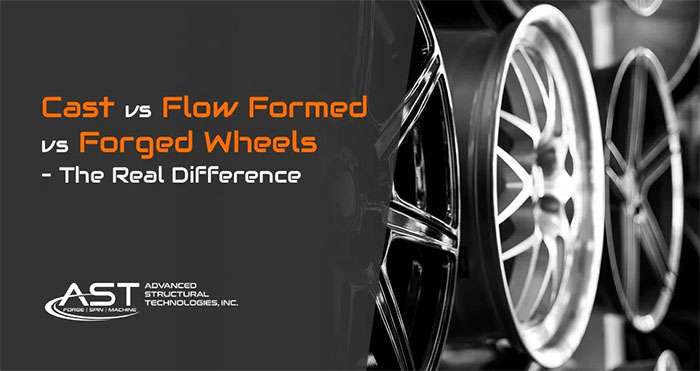
Image Source: Forged Wheels
Cast alloy wheels dominate the wheel market, accounting for about 90% of OEM wheels equipped on new vehicles today. The manufacturing process involves pouring molten aluminum into a mold that forms the material into the desired wheel shape. This straightforward technique allows manufacturers to create visually appealing designs at scale while keeping costs reasonable.
Two primary casting methods drive production today. Gravity casting utilizes earth's gravity to fill the mold with molten aluminum, providing a cost-effective solution for mass production. Low-pressure casting injects the aluminum into the mold under pressure, creating a denser, more consistent wheel with improved mechanical properties.
Cast wheels offer the best value for most drivers. Their relatively simple production method makes them considerably less expensive than forged or multi-piece alternatives. These wheels deliver impressive weight advantages, being significantly lighter than traditional steel wheels.
Cast wheels provide excellent shock and vibration absorption. This characteristic enhances ride comfort during daily driving. The manufacturing process allows for extraordinary design flexibility, offering endless style options from sleek chrome to matte black finishes.
Cast wheels do have structural limitations. To compensate for possible porosity (microscopic air pockets formed during cooling), manufacturers often add extra material to strengthen the wheels, which increases their weight. This additional mass somewhat reduces performance advantages compared to forged alternatives.
Pros:
Budget-friendly cost makes them accessible to most drivers
Wide variety of designs and finishes
Superior rust resistance compared to steel wheels
Good shock and vibration absorption
Readily available without long lead times
Cons:
Heavier than forged wheels due to additional material needed for strength
Less effective heat dissipation during aggressive driving
More brittle than forged wheels, potentially cracking under high stress
Possible porosity issues affecting long-term durability
Less suitable for extreme performance applications
Cast wheels excel for everyday driving where cost, design, and practical durability matter most. They're perfectly suited for daily commuters, weekend cruisers, and street-focused vehicles. They provide an excellent option for drivers seeking visual upgrades without premium pricing.
Cast wheels perform admirably in light off-roading situations. For hardcore off-road enthusiasts or serious performance drivers, other wheel types might better suit those extreme conditions.
For custom street builds where visual impact matters, cast wheels offer exceptional value with their wide range of styles and sizes. Their accessibility and affordability make them the go-to choice for most vehicle customization projects.
Cast wheels remain the most affordable alloy wheel option. Our market research shows prices typically follow this structure:
| Size | Price Range |
|---|---|
| 17" | $247-$255 |
| 18"-19" | $255-$351 |
| 20" | $316-$446 |
| 22" | $261-$362 |
These prices reflect different styles and finishes, with premium designs commanding higher prices within each size category. Cast wheels consistently offer better value than forged or multi-piece alternatives.
Cast wheels demonstrate solid longevity under normal driving conditions. They handle everyday stresses reliably, making them suitable for most drivers' needs. Reputable manufacturers implement strict quality control to minimize porosity issues that might otherwise reduce fatigue strength over time.
Avoid harsh impacts and extreme driving conditions that could potentially crack these more brittle wheels. For standard street use and occasional spirited driving, cast wheels provide ample durability without requiring the investment that forged wheels demand.
Quality cast wheels perform dependably even with light off-road use. They strike an ideal balance between affordability and longevity that satisfies the vast majority of drivers' requirements.
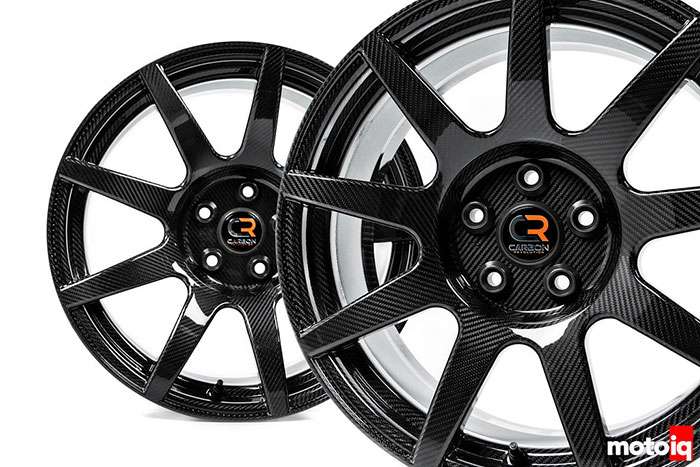
Image Source: MotoIQ
Carbon fiber alloy wheels represent the most advanced wheel technology available today. These lightweight components combine carbon fiber-reinforced polymers with aluminum or magnesium alloys to create wheels that outperform traditional materials in multiple areas. The manufacturing process involves weaving carbon fibers together into specific patterns, then bonding them with resin or epoxy to form incredibly strong yet lightweight structures.
Carbon fiber wheels deliver extraordinary weight reduction—typically 40-50% lighter than comparable aluminum wheels while maintaining equivalent strength. This dramatic weight saving creates a profound impact on vehicle performance and handling.
The exceptional stiffness provides multiple performance benefits, primarily improving handling precision and power transfer. Carbon fiber's natural properties allow engineers to design wheels with optimized aerodynamic profiles without significant weight penalties.
Carbon fiber wheels also excel at reducing noise and vibration. The material's damped nature inherently decreases road noise transmission—an advantage that's particularly noticeable in electric vehicles where engine noise is absent.
Pros:
Exceptional weight reduction—up to 50% lighter than aluminum
Superior stiffness for better power transfer and handling
Improved acceleration and reduced braking distances
Enhanced fuel efficiency or EV range (5-10% improvement)
Reduced road noise and vibration
Ability to withstand extreme temperatures
Cons:
Substantially higher cost than other wheel types
Vulnerability to impact damage—carbon cracks rather than dents
Limited repairability once damaged
Reduced availability compared to traditional wheels
Less forgiving on rough roads or with impacts
Carbon fiber wheels excel in high-performance applications where weight savings directly translate to competitive advantages. Racing environments benefit substantially, as carbon wheels can save approximately 1.5 seconds over a 2-minute lap.
Luxury and exotic vehicles frequently feature carbon fiber wheels both for performance benefits and visual distinction. They make the most sense for vehicles where maximum performance justifies the premium investment.
Electric vehicles represent another ideal application, as the reduced rotational mass improves range significantly. For EVs, the investment can yield tangible efficiency benefits beyond pure performance gains.
| Application | Price Range (per wheel) |
|---|---|
| Performance | $5,000-$6,350 |
| Luxury SUV | $11,995-$15,500 |
| Exotic Cars | $12,000+ |
These prices reflect the complex manufacturing processes and advanced materials involved. Currently, few companies possess the capability to produce carbon fiber wheels at scale.
Carbon fiber wheels typically last 4-7 years with regular use. Their longevity depends largely on driving conditions, maintenance practices, and exposure to impacts.
Unlike metals, carbon fiber doesn't fatigue in the traditional sense. When properly manufactured and undamaged, these wheels can theoretically last indefinitely. The primary longevity concern involves impact damage rather than structural degradation over time.
Regular inspection remains crucial for maximum lifespan, as damage isn't always immediately visible. Owners should routinely check for cracks, delamination, or other signs of structural compromise.
When selecting alloy wheels for your vehicle, comparing the key characteristics helps you make the right choice for your specific needs and budget. Here's a quick reference guide to the five main types of alloy wheels:
| Attribute | One-Piece Alloy | Two-Piece Alloy | Forged Alloy | Cast Alloy | Carbon Fiber Alloy |
|---|---|---|---|---|---|
| Manufacturing Process | Single continuous piece, cast or forged | Two separate components joined by welding or bolting | Compressed from solid aluminum billet under extreme pressure | Molten aluminum poured into molds | Carbon fiber-reinforced polymers combined with alloys |
| Weight Characteristics | 21% lighter than steel wheels | Slightly heavier than one-piece | 25-30% lighter than cast wheels | Heavier than forged due to additional material | 40-50% lighter than aluminum wheels |
| Price Range (Entry Level) | $233-342 (Cast) | $1,100-1,175 | $400-700 | $247-255 (17") | $5,000-6,350 |
| Durability | Can last vehicle lifetime with proper care | Excellent fatigue life, repairable components | Superior resistance to fatigue and deformation | Good for daily use, more brittle than forged | 4-7 years with regular use |
| Best Use Cases | Daily drivers and street performance | Custom builds and performance applications | High-performance sports cars and motorsports | Daily commuters and street-focused vehicles | Racing and high-performance applications |
| Key Advantages | Higher tensile strength, minimal maintenance | Highly customizable, replaceable components | Exceptional strength, superior heat dissipation | Budget-friendly, wide variety of designs | Superior stiffness, reduced noise/vibration |
| Main Disadvantages | Limited customization options | Higher initial cost, requires regular maintenance | Substantially higher cost, limited availability | More brittle, less effective heat dissipation | Very expensive, vulnerable to impact damage |
This comparison makes it clear that each wheel type serves different purposes. Cast alloy wheels offer the best value for everyday driving, while forged options deliver maximum performance for serious enthusiasts. Two-piece wheels excel when you need custom fitment, and carbon fiber represents the ultimate in weight reduction for racing applications.
Alloy wheels provide substantial advantages over traditional steel wheels, and the right choice comes down to matching your specific driving needs with your budget. One-piece alloy wheels deliver excellent durability and value for daily driving, while two-piece options shine when customization matters most. Forged wheels offer exceptional strength-to-weight ratios that performance enthusiasts demand, despite their higher investment.
Cast alloy wheels remain the most popular choice for good reason—they balance affordability with visual appeal for everyday drivers. Carbon fiber alternatives represent the pinnacle of wheel technology, delivering unmatched weight reduction for those applications where maximum performance justifies the premium cost.
Your driving style should guide your wheel selection. Daily commuters find cast alloy wheels perfectly suitable, while track enthusiasts benefit from investing in forged options. Off-road adventurers often prefer two-piece wheels for their durability and repairability when exploring challenging terrain.
Budget plays a crucial role in this decision. The price gap between entry-level cast wheels around $250 and carbon fiber options exceeding $5,000 per wheel reflects genuine performance differences that matter for specific applications—not just manufacturing complexity.
Choose wheels that match both your vehicle's requirements and your driving habits. You can explore our wide selection of alloy wheels at Performance Plus Tire to find options that balance your performance needs, style preferences, and budget perfectly.
The right set of wheels transforms both your vehicle's appearance and performance. With this knowledge about different alloy wheel types, you're ready to make an informed decision that enhances your driving experience for years to come.
Understanding the five main types of alloy wheels helps you choose the perfect balance of performance, esthetics, and budget for your specific driving needs.
One-piece wheels offer the best value - Cast versions start at $233-342, providing 21% weight reduction over steel with minimal maintenance requirements for daily drivers.
Two-piece wheels excel in customization - Modular design allows extensive fitment options and component replacement, ideal for modified vehicles despite higher $1,100+ costs.
Forged wheels deliver premium performance - 25-30% lighter than cast alternatives with superior strength, perfect for motorsports but commanding $400-700+ per wheel.
Cast wheels dominate the market - Found on 90% of new vehicles, they balance affordability ($247-446) with design variety for everyday driving needs.
Carbon fiber represents the future - Up to 50% lighter than aluminum with exceptional stiffness, but $5,000+ pricing limits them to high-performance applications.
The key is matching wheel type to your driving style: cast for daily commuting, forged for track performance, two-piece for custom builds, and carbon fiber for ultimate performance where budget isn't a constraint.
There are five main types of alloy wheels: one-piece alloy, two-piece alloy, forged alloy, cast alloy, and carbon fiber alloy wheels. Each type has unique characteristics, manufacturing processes, and best use cases.
Cast alloy wheels are more affordable and widely available, made by pouring molten aluminum into molds. Forged alloy wheels are stronger and lighter, created by compressing solid aluminum under extreme pressure. Forged wheels offer superior performance but at a higher cost.
Cast alloy wheels are typically the best choice for everyday driving. They offer a good balance of affordability, design variety, and durability for normal road conditions. They're found on about 90% of new vehicles due to their practicality for daily use.
Carbon fiber alloy wheels can be worth the investment for high-performance applications. They're 40-50% lighter than aluminum wheels, improving acceleration, handling, and fuel efficiency. However, their high cost (starting at $5,000 per wheel) limits them to luxury, exotic, or racing vehicles.
The lifespan of alloy wheels varies by type and usage. One-piece and cast alloy wheels can last the lifetime of a vehicle with proper care. Forged wheels offer exceptional longevity due to their strength. Carbon fiber wheels typically last 4-7 years with regular use. Proper maintenance and avoiding impacts are key to maximizing wheel lifespan.